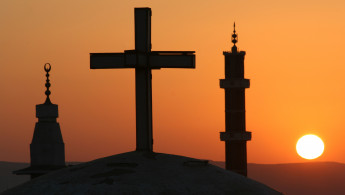Why is Egypt's 20th grand mufti Nazir Ayyad under intense scrutiny?
Hours after Egypt's President Abdel Fattah al-Sisi appointed Nazir Ayyad as the country's 20th grand mufti, concerns emerged about the prominent professor of Islamic philosophy and creed among several circles in the Muslim-dominated country.
Ayyad's book, 'Problems in Christian Creed: the Christians’ Trinity Doctrine, Criticism and Presentation,' published in Arabic in 2016, has been spotlighted in the ongoing uproar even before he assumed the prestigious post.
In his book, Ayyad argues that "Monotheism is the basis of all divine messages," while deeming, in some parts of the text, Christians to be "disbelievers."
Social media activists, whether secular intellectuals, Christians, or Muslims, slammed Ayyad, using quotes in his book and during televised interviews that many found to be sectarianism and antagonistic.
Others questioned the seriousness of the country's initiatives on the renewal of religious discourse, frequently called on by Sisi over the past decade to fight religious fanaticism.
A man of tolerance or division?
Criticism became further entrenched after Ayyad boasted in media interviews about how his interfaith-like first name stood for tolerance.
The new mufti's name coincidently resembles the birth name of the late Pope Shenouda III, the Coptic Pope of Alexandria, born Nazir Gayed. Pope Sheouda III is revered by almost all Egyptian Orthodox Christians, even after his demise in 2012.
One social media user, Investment@Habib, sarcastically wrote on X: "Our holy Pope Nazir Ayyad is a man of God."
Most of Egypt's Christians are Coptic Orthodox, and they are among the world's oldest Christian communities.
In Egypt, Christian laws are only applied on married marriage and divorce, while the Islamic Sharia law is enforced otherwise.
"The Christian minority in Egypt now is pessimistic about Ayyad holding the position given his stance towards us and Christianity and our long-time legal pursuit to have our religious rules applied on key matters such as inheritance," a Coptic intellectual told The New Arab on condition of anonymity due to the sensitivity of the subject.
Renowned political sociologist Said Sadek begs to differ from the Christian thinker, though.
"A mufti usually serves the political system and is subject to its control. His historical job has always been to serve, justify and defend public policy through issuing religious fatwas," Sadek, also a professor of political sociology at Egypt-Japan University of Science and Technology, told TNA.
"It is not about who the person is. Rather, it all is about the impact of the job and how it functions," Sadek added.
Established in 1895 as a religious body administratively and financially independent of the government, the Dar al-Ifta has increasingly become entwined with the politics of Egypt and the government.
The office of grand mufti is also closely related to the issuing of death sentences, with the mufti required to ratify death sentences.




 Follow the Middle East's top stories in English at The New Arab on Google News
Follow the Middle East's top stories in English at The New Arab on Google News


